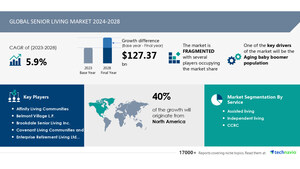NEW YORK, Sept. 20, 2024 /PRNewswire/ -- Report on how AI is redefining market landscape - The global soft tissue repair market size is estimated to grow by USD 3.29 billion from 2024-2028, according to Technavio. The market is estimated to grow at a CAGR of over 4.2% during the forecast period. Rising incidence of accidental injuries is driving market growth, with a trend towards growing demand for gene therapy However, high cost of clinical trials and failure rate in clinical trials poses a challenge - Key market players include 3M Co., Acera Surgical Inc., AlloSource, Arthrex Inc., Artivion Inc., Becton Dickinson and Co., Conmed Corp., Ed. Geistlich Sohne AG, Integra Lifesciences Corp., Johnson and Johnson Services Inc., JRF Ortho, Koninklijke DSM NV, LifeCell International Pvt. Ltd., LifeNet Health Inc., Medtronic Plc, RTI Surgical Inc., Smith and Nephew plc, Stryker Corp., Tissue Regenix Group Plc, and Zimmer Biomet Holdings Inc..
AI-Powered Market Evolution Insights. Our comprehensive market report ready with the latest trends, growth opportunities, and strategic analysis- View your snapshot now
Forecast period |
2024-2028 |
Base Year |
2023 |
Historic Data |
2018 - 2022 |
Segment Covered |
End-user (Hospitals, Ambulatory surgical services, and Clinics), Product (Soft tissue fixation devices and accessories, Cell therapy, and Tissue scaffold), and Geography (North America, Europe, Asia, and Rest of World (ROW)) |
Region Covered |
North America, Europe, Asia, and Rest of World (ROW) |
Key companies profiled |
3M Co., Acera Surgical Inc., AlloSource, Arthrex Inc., Artivion Inc., Becton Dickinson and Co., Conmed Corp., Ed. Geistlich Sohne AG, Integra Lifesciences Corp., Johnson and Johnson Services Inc., JRF Ortho, Koninklijke DSM NV, LifeCell International Pvt. Ltd., LifeNet Health Inc., Medtronic Plc, RTI Surgical Inc., Smith and Nephew plc, Stryker Corp., Tissue Regenix Group Plc, and Zimmer Biomet Holdings Inc. |
Key Market Trends Fueling Growth
Gene therapy holds great promise in the field of soft tissue repair, with approximately 65% of clinical trials focusing on cancer therapy. Researchers are exploring gene therapy's potential for wound healing by manipulating the tissue growth factor beta (TGF-beta), which induces cell proliferation and aids in healing. In Europe, GlaxoSmithKline, in collaboration with the San Raffaele Telethon Institute for Gene Therapy and Milanese biotech MoIMed, has developed Strimvelis, an investigational gene therapy product awaiting European Commission approval. Though no gene therapy products are approved in the US, Abeona Therapeutics is developing a gene therapy product, EB-101, for wound healing and has initiated a Phase II trial for recessive dystrophic epidermolysis bullosa. Positive clinical results and product approval will significantly expand the global soft tissue repair market.
The Soft Tissue Repair market is witnessing significant growth due to the increasing number of orthopedic procedures for trauma patients and sports injuries. The obesity rate is also driving demand, as excess weight puts pressure on muscles, fibrous tissue, blood vessels, and connective tissues, leading to various musculoskeletal disorders. The geriatric population and those with chronic diseases like cystic fibrosis, hepatitis, cardiovascular disease, cancer, and age-related physiological changes require soft tissue repair. Surgeons use tissue patches or synthetic meshes for soft tissue restoration. Companies like Myriad and Aroa Biosurgery lead the market with their surgical mesh portfolios. Hernia cases are common, and resorbable polymer technology offers a solution. Lifestyle concerns, such as obesity and osteoporosis, and metabolic inefficiencies, contribute to the market's growth. Soft tissue repair is essential for treating various conditions, including low back discomfort, neck pain, osteoarthritis, fractures, amputations, rheumatoid arthritis, and surgical procedures for hernia repair, adult inguinal hernias, and other musculoskeletal disorders.
Insights on how AI is driving innovation, efficiency, and market growth- Request Sample!
Market Challenges
- The soft tissue repair market involves significant investments for vendors, particularly during the clinical trial phase. Most trials are conducted in high-income countries like the US, UK, Germany, France, Japan, Singapore, and South Korea, resulting in high costs for product development and launch. Small vendors and start-ups often seek funding, but resources are limited. The cost of bringing a soft tissue repair product, such as cell therapy-based treatments, from pre-clinical development to approval can reach up to USD1.5 billion. Factors like dosing, delivery, toxicity, and immune rejection must be addressed during clinical trials. Failure to identify these factors in the pre-clinical stage can lead to high failure rates and economic burdens for vendors. A study by the Public Health Department, Aix Marseille University, and Creativ-Ceutical found that of the 939 clinical trials for advanced therapy medicinal products (ATMPs), only 53.6% were for somatic cell therapies, and only five ATMPs were granted approval, including one cell therapy product, PROVENGE. These challenges may hinder the growth of the global soft tissue repair market during the forecast period.
- The Soft Tissue Repair market encompasses various segments, including Skin repair, Orthopaedic repair, Dental repair, and Breast reconstruction repair. Challenges in this industry include injuries from hospitals, clinics, ambulatory surgery centers, emergency care centers, and burn care centers. Soft tissue injuries, such as strains, tendon damage, and ligament tears, result from road traffic crashes, accidents, and sports-related incidents. An aging population with chronic conditions like diabetes-related gangrene, peripheral vascular disease, and osteoporosis-related fractures fuels demand. Regulatory approval for biomaterials, cells, and biomolecules used in suturing techniques and synthetic materials is crucial. Market segments include Allograft and Orthopedics, with applications in tumors, infections, spine diseases, congenital disorders, and traumatic brain injuries.
Insights into how AI is reshaping industries and driving growth- Download a Sample Report
Segment Overview
This soft tissue repair market report extensively covers market segmentation by
- End-user
- 1.1 Hospitals
- 1.2 Ambulatory surgical services
- 1.3 Clinics
- Product
- 2.1 Soft tissue fixation devices and accessories
- 2.2 Cell therapy
- 2.3 Tissue scaffold
- Geography
- 3.1 North America
- 3.2 Europe
- 3.3 Asia
- 3.4 Rest of World (ROW)
1.1 Hospitals- Hospitals are significant buyers in the soft tissue repair market due to the increasing demand for these products in various departments. Large hospitals, with over 500 beds, are key consumers, procuring in bulk and engaging with multiple suppliers. Their advanced medical infrastructure caters to a larger patient base, leading to an increased need for soft tissue repair solutions. Medium-sized hospitals, with around 200-300 beds, also contribute to market growth. Their decentralized administration and growing number of emergency department visits, particularly for TBI and orthopedic cases, necessitate the use of soft tissue repair products. This trend is expected to continue driving the growth of the hospitals segment in the global soft tissue repair market.
Download complimentary Sample Report to gain insights into AI's impact on market dynamics, emerging trends, and future opportunities- including forecast (2024-2028) and historic data (2018 - 2022)
Research Analysis
Soft tissue repair refers to the process of restoring damaged muscle, fibrous tissue, blood vessels, and connective tissues. This procedure is commonly used in orthopedic surgeries for various conditions such as trauma injuries, sports injuries, strains, tendon damage, and ligament tears. Trauma patients, including those from road traffic crashes and sports-related incidents, often require soft tissue repair. The repair techniques include transabdominal preperitoneal repair and completely extraperitoneal repair. Additionally, soft tissue repair is essential for individuals with conditions like hernia, rotator cuff tear, cystic fibrosis, hepatitis, cardiovascular disorders, and cancer. Aroa Biosurgery is a leading technology in soft tissue restoration, providing innovative solutions for wound care and tissue repair. Soft tissue injuries can significantly impact a patient's quality of life, and timely and effective repair is crucial for recovery.
Market Research Overview
The global soft tissue repair market is witnessing significant growth due to the increasing prevalence of orthopedic procedures, trauma patients, and sports injuries. Soft tissue repair involves the restoration of damaged muscles, fibrous tissue, blood vessels, and connective tissues using various techniques such as surgical procedures and tissue patches/meshes. The obesity rate is also a major factor driving the market growth as obesity increases the risk of musculoskeletal disorders, including hernia cases. Age-related physiological changes, chronic diseases like cystic fibrosis, hepatitis, cardiovascular disease, and cancer, also contribute to the market growth. Psychological pressure, geriatric population, and metabolic inefficiencies are other factors driving the demand for soft tissue repair. The market includes various players offering tissue patch/mesh, synthetic mesh, and biologics. Orthopedic surgeries, extracellular matrix, and resorbable polymer technology are some of the key trends in the market. The market caters to various surgical care facilities, including hospitals, clinics, ambulatory surgery centers, emergency care centers, and burn care centers. Soft tissue injuries from strains, tendon damage, ligament tears, road traffic crashes, and accidents are common and require surgical intervention. The baby boomer population and the increasing prevalence of chronic conditions like diabetes-related gangrene and peripheral vascular disease also contribute to the market growth. The market includes various surgical procedures, including laparoscopic instrument injectors, dural repair, vaginal sling procedures, skin repair, orthopaedic repair, dental repair, and breast reconstruction repair. Skilled surgeons and clinical trials are essential to the market's growth, and medical tourism is also a significant factor influencing the market dynamics.
Table of Contents:
1 Executive Summary
2 Market Landscape
3 Market Sizing
4 Historic Market Size
5 Five Forces Analysis
6 Market Segmentation
- End-user
- Hospitals
- Ambulatory Surgical Services
- Clinics
- Product
- Soft Tissue Fixation Devices And Accessories
- Cell Therapy
- Tissue Scaffold
- Geography
- North America
- Europe
- Asia
- Rest Of World (ROW)
7 Customer Landscape
8 Geographic Landscape
9 Drivers, Challenges, and Trends
10 Company Landscape
11 Company Analysis
12 Appendix
About Technavio
Technavio is a leading global technology research and advisory company. Their research and analysis focuses on emerging market trends and provides actionable insights to help businesses identify market opportunities and develop effective strategies to optimize their market positions.
With over 500 specialized analysts, Technavio's report library consists of more than 17,000 reports and counting, covering 800 technologies, spanning across 50 countries. Their client base consists of enterprises of all sizes, including more than 100 Fortune 500 companies. This growing client base relies on Technavio's comprehensive coverage, extensive research, and actionable market insights to identify opportunities in existing and potential markets and assess their competitive positions within changing market scenarios.
Contacts
Technavio Research
Jesse Maida
Media & Marketing Executive
US: +1 844 364 1100
UK: +44 203 893 3200
Email: [email protected]
Website: www.technavio.com/
SOURCE Technavio

WANT YOUR COMPANY'S NEWS FEATURED ON PRNEWSWIRE.COM?
Newsrooms &
Influencers
Digital Media
Outlets
Journalists
Opted In





Share this article